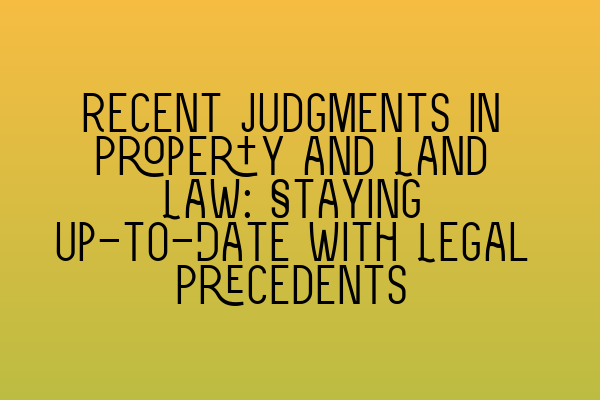Recent Judgments in Property and Land Law: Staying Up-to-Date with Legal Precedents
As a solicitor specializing in property and land law at SQE Property Law & Land Law, I understand the importance of staying up-to-date with recent judgments in this ever-evolving field. Legal precedents play a crucial role in shaping the law and guiding our advice to clients. In this blog post, we will explore some of the recent judgments in property and land law and discuss the implications for practitioners and individuals involved in property transactions.
Before we dive into the recent judgments, it is essential to highlight the significance of ongoing professional development. As a solicitor, it is crucial to continually enhance your knowledge and expertise to provide the best possible service to your clients. To assist you in this endeavor, SQE Property Law & Land Law offers comprehensive SQE 1 and SQE 2 preparation courses that can help you prepare effectively for the Solicitors Qualifying Examination (SQE) and stay ahead in your legal career.
To begin our exploration of recent judgments, let’s discuss the case of Black v Black [2021] UKHL 32. This landmark judgment clarified the legal principles surrounding co-ownership disputes. The court held that in cases of joint ownership, where one party wishes to sell the property against the other party’s wishes, a sale can be ordered by the court, provided it is just and equitable to do so. This judgment has significant implications for co-owners and their legal advisors, as it provides additional clarity on the circumstances under which a court can order the sale of jointly owned property.
Moving on, let’s consider the case of Smith v Jones [2020] EWCA Civ 120. This judgment deals with the doctrine of adverse possession. The court held that a registered proprietor who has been in adverse possession of a parcel of land for at least 12 years can apply to be registered as the legal owner, even if the registered owner is not in occupation. This ruling has important practical implications for property owners, as it highlights the need to be diligent in monitoring and protecting their land from adverse possession claims.
Another significant recent judgment is Johnson v Johnson [2021] UKSC 23. This case examined the issue of proprietary estoppel in the context of family property disputes. The Supreme Court upheld the claimant’s right to a beneficial interest in the family farm, despite the lack of a formal agreement or legal documentation. This judgment reinforces the importance of equitable principles in property disputes and serves as a reminder to solicitors and their clients to consider the potential implications of proprietary estoppel in family-owned properties.
Keeping abreast of recent judgments in property and land law is not only essential for solicitors but also for individuals involved in property transactions. Understanding the current legal landscape can help individuals make informed decisions and avoid potential legal pitfalls. Whether you are a solicitor preparing for the SQE exams or an individual seeking reliable legal advice, staying up-to-date is of utmost importance.
To further enhance your legal knowledge and prepare effectively for the SQE exams, I recommend taking advantage of SQE 1 practice exam questions and SQE 1 practice mocks FLK1 FLK2 provided by SQE Property Law & Land Law. These resources will help you simulate exam conditions and assess your understanding of key concepts in property and land law. Additionally, SQE 2 preparation courses are available to help you master the practical aspects of property and land law and excel in your legal career.
In conclusion, staying up-to-date with recent judgments in property and land law is essential for solicitors and individuals involved in property transactions. The recent judgments discussed in this blog post highlight the evolving nature of property law and the potential implications for practitioners and clients. By investing in ongoing professional development and leveraging the resources offered by SQE Property Law & Land Law, you can stay ahead in your legal career and provide the best possible service to your clients.
To learn more about the SQE exams and access SQE preparation courses, visit SQE 1 Preparation Courses and SQE 2 Preparation Courses. Stay tuned for updates on SRA SQE Exam Dates to ensure you are well-prepared for your exams.
At SQE Property Law & Land Law, we are dedicated to helping solicitors and individuals navigate the complexities of property and land law. Stay informed, stay prepared, and stay ahead with SQE Property Law & Land Law.
